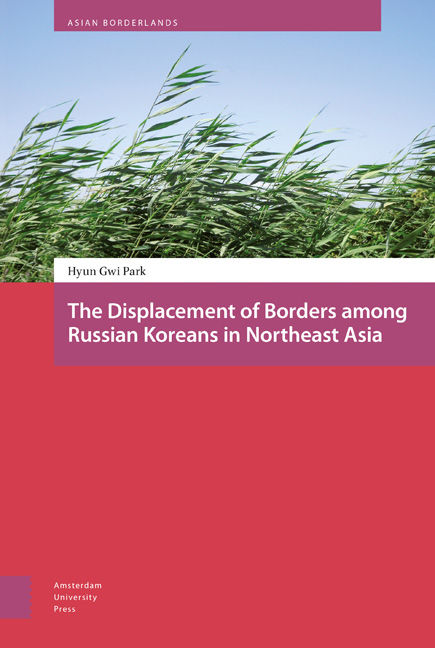Book contents
- Frontmatter
- Dedication
- Contents
- List of Maps, Figures and Tables
- Acknowledgements
- Note on transliteration, translation, and names
- Preface: Clearing the Ground
- Introduction: the Obscure Presence of Russian Koreans in Northeast Asia
- 1 The History of âthe Korean Questionâ and Border-Making in the Russian Far East
- 2 Repatriating to the Russian Far East, Confronting the Transition
- 3 Living Soviet Socialism the Korean way: Mobile Agriculture at the Border of Socialism
- 4 Greenhouse Society: the Subsistence Economy and Householding
- 5 Recalling History: Koreiskii Dom, Transnational Connections, and Diaspora Politics
- Epilogue
- Appendix 1
- Appendix 2
- Glossary
- Bibliography
- Index
Introduction: the Obscure Presence of Russian Koreans in Northeast Asia
Published online by Cambridge University Press: 12 February 2021
- Frontmatter
- Dedication
- Contents
- List of Maps, Figures and Tables
- Acknowledgements
- Note on transliteration, translation, and names
- Preface: Clearing the Ground
- Introduction: the Obscure Presence of Russian Koreans in Northeast Asia
- 1 The History of âthe Korean Questionâ and Border-Making in the Russian Far East
- 2 Repatriating to the Russian Far East, Confronting the Transition
- 3 Living Soviet Socialism the Korean way: Mobile Agriculture at the Border of Socialism
- 4 Greenhouse Society: the Subsistence Economy and Householding
- 5 Recalling History: Koreiskii Dom, Transnational Connections, and Diaspora Politics
- Epilogue
- Appendix 1
- Appendix 2
- Glossary
- Bibliography
- Index
Summary
I first met Katia Kim in the early spring of 2003 when I was conducting fieldwork with Russian Koreans in a village called Novoselovo in Primorskii Krai (see Map 3). She had been born in 1928 in Pos’et, a coastal fishing settlement near the border between Russia and North Korea. During the Stalinist purge of Koreans in the Russian Far East1 (hereafter the RFE) in autumn 1937, she and her parents were forcibly relocated to Ushtobe, Kazakhstan. She married in Kazakhstan and lived on the rice-cultivation collective farm where her husband worked until 1993, when she returned to the RFE with her family following the collapse of the Soviet Union. Her experiences of displacement were the direct result of great political upheaval. She described how Koreans in the former Soviet Union were forcibly relocated and how they endured backbreaking labor because they did not have ‘their own land’. This sense of displacement pervades the perceptions of the majority of elderly Russian Koreans, especially those who are old enough to have personally experienced the events of 1937. Yet this acute awareness of being a displaced people without any territory of their own appeared to be somewhat at odds with the vigorous and tenacious vitality that characterized their lives. This led me to wonder whether their view of the past and their lack of ‘their own land’ were more of a nostalgic lament than a fundamental issue in their day-to-day lives. At the level of the nation-state, Kim's summing up of the Russian Koreans’ context was consistent with social scientific studies about their migration and displacement. However, my ethnographic observation of her daily social transactions – and those of many other Russian Koreans in the RFE – led me to question the very meaning of this displacement. This book is a result of that questioning: it attempts to address the issue of displacement at the level of the nation-state from an ethnographic perspective based on long-term fieldwork.
It is hard to define Russian Koreans in the RFE as single community, since they lack clear boundaries like areas of concentrated residence, a traditional religion, or their own native language – all lost in the process of ‘Russification’ that they underwent during the Soviet socialist period. Despite this, Koreans in the RFE still maintain a certain sense of themselves as ‘Koreans’.
- Type
- Chapter
- Information
- Publisher: Amsterdam University PressPrint publication year: 2017



